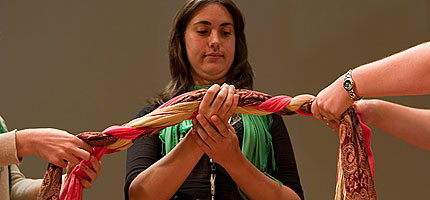Women and men together make the body of Christ whole, as three strands are needed to make a braid -- "a threefold cord [that] is not quickly broken" (Ecclesiastes 4:12). Helping illustrate this verse is Heidrun Tobler, Evangelical Lutheran Church in Southern Africa (Natal-Transvaal), during the women's report at the LWF Eleventh Assembly. © LWF/Erick Coll
23.07.2010
Women Identify Human Trafficking, Women in Leadership, and Poverty as Issues for Attention
Delegation Asks Assembly to Address Injustices
STUTTGART, Germany, 23 July 2010 – Human trafficking, leadership by women in churches and society, and unequal food distribution have emerged as key issues for women around the world, according to the presentation on behalf of women at the Eleventh Assembly of the Lutheran World Federation (LWF). These issues were identified in the Women’s Pre-Assembly meeting and regional meetings as requiring action by the LWF.
Human Trafficking
Rev. Selma Chen of The Lutheran Church of Taiwan told the Assembly that at least 27 million people — women, men, and children — are being trafficked worldwide, within their own countries and across borders. Rev. Annika Laats of the Estonian Evangelical Lutheran Church added that in “our own backyards,” people are being exploited and are being forced to work for little or no pay.
As an example of human trafficking, Rev. Elitha Moy of the Evangelical Lutheran Church in Zimbabwe said that in Tanzania some mothers give their daughters to friends, who promise to feed, clothe and educate the girls. They are then forced to watch pornography in order to learn the sex trade and are shipped to Zanzibar and then to another country. There the girls are forced to bear children, whom they are not allowed to keep. When they are no longer able to bear children, the girls are shot or poisoned.
The six-member delegation called on member churches “to engage in advocacy and awareness programs, to develop strategies to overcome ignorance, and denounce the sin of human trafficking.”
Women in leadership in church and society
Full participation by both women and men continues the reformation and the transformation of the church, the delegation said. But this is not happening in all member churches of the LWF; some churches still do not ordain women. President of the Federation of Evangelical Lutheran Churches in Switzerland and Liechtenstein, Dagmar Magold, said that her ministry as a pastor is measured against “what men have done.” She said that some churches refuse to ordain women because some people think that this ministry is for men only, and sometimes is based not on theological but on cultural and traditional grounds.
The delegation called on member churches to adopt policies that promote women in both lay and ordained leadership positions. It further appealed to those churches that do not ordain women “to prayerfully consider the effect that inaction and refusal on this matter has on those who are precluded from exercising their God-given calling.”
“The pain of exclusion and the loss of God-given gifts are experienced by the whole church,” the women said.
Food security
“Poverty has a woman’s face,” said Moy. A chasm separates those who are hungry and deprived, and those who consume too much. The women’s delegation urged member churches to engage in advocacy campaigns with governments directed towards securing “food justice” for all. They also asked the LWF to connect member churches with one another and with civil society efforts, with the goal of achieving a “worldwide increase in food sovereignty.”
As they laid a tablecloth on a table, the six women said that the cloth “sets and prepares the table” for daily bread. Laats explained that, in a similar way, “the Lutheran community is also called to be a table that is set and prepared for cultural transformation.” (539 words)

